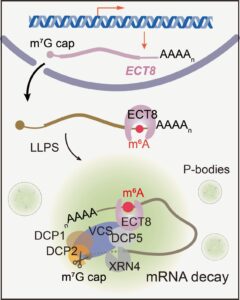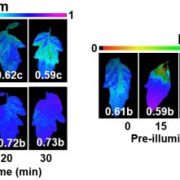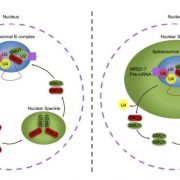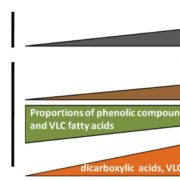The Role of ECT8 in Decoding Salt Stress Resistance in Plants
Zhihe Cai (Synthetic and Functional Biomolecules Center, Beijing National Laboratory for Molecular Sciences, Key Laboratory of Bioorganic Chemistry and Molecular Engineering of Ministry of Education, College of Chemistry and Molecular Engineering, Peking University, Beijing 100871, China)
https://doi.org/10.1093/plcell/koae149
Background: We’ve been studying a protein named ECT8 in a common plant called Arabidopsis. This protein can spot and catch a specific tag, known as m6A, on the plant’s RNA – a molecule that carries out the DNA’s instructions.
 Question: We wanted to know how ECT8 interacts with this tagged RNA and what happens to the RNA afterwards, especially when the plant is dealing with too much salt.
Question: We wanted to know how ECT8 interacts with this tagged RNA and what happens to the RNA afterwards, especially when the plant is dealing with too much salt.
Findings: We found out that ECT8 helps break down this tagged RNA faster, especially when the plant is under salt stress. But, when we messed with ECT8, the plant became more sensitive to salt because it started making more proteins that make it less salt-tolerant.
Next Steps: The question now is how we can use this new understanding of ECT8 to help plants better handle stress. This could change crop cultivation in challenging environments.
Reference:
Zhihe Cai, Qian Tang, Peizhe Song, Enlin Tian, Junbo Yang, Guifang Jia (2024) The m6A reader ECT8 is an abiotic stress sensor that accelerates mRNA decay in Arabidopsis https://doi.org/10.1093/plcell/koae149









